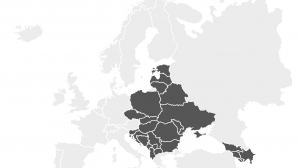Many countries in emerging Europe have established themselves as outsourcing destinations for foreign companies. Tom Quigley, CEO of the Emerging Europe Alliance for Business Services, Innovation and Technology, points out that there are four main reasons (amongst others) that make central and eastern Europe (CEE) a region that stands out above others for outsourcing: language skills and education, culture, government support and small time zone differences.
Among the well-established outsourcing destinations in the region is Bulgaria, a recipient of the Global Sourcing Association Award for Offshoring Destination of the Year 2015. The country was also in the top three places in 2016 and 2017. Undoubtedly, Bulgaria has since then developed its outsourcing industry further – the country has transitioned from a location for relatively basic outsourcing services, such as call centres, to offering more advanced and complex services such as business process outsourcing (BPO) and information technology outsourcing (ITO) services, subsequently becoming one of the world’s leading outsourcing destinations.
Poland is another outsourcing success story in emerging Europe. “It is largest and most mature outsourcing destination in the region,” says Mr Quigley. A lot of the pull-factors for outsourcing in Poland are not too different to those of Bulgaria: a highly-skilled workforce, a dynamically growing IT market, an extensive pool of IT graduates and graduates with a professional level of (at least) English, a similarity in cultural and work ethics, low labour costs, good quality technological infrastructure, attractive tax incentives, geographic proximity to major European financial centres and time zones, second-tier towns (such as Kraków) to name a few.
However, there is emerging evidence that the outsourcing sector in some of these established destinations may be plateauing. “The outsourcing business in Bulgaria is entering its matured stage. While growth is still visible, it has dropped to approximately 10-15 per cent year on year” Stefan Bumov, co-founder and COO at HeleCloud, told Emerging Europe. Although second-tier cities, such as Plovdiv, Varna and Kraków are subsequently attracting investors that are already established in the capitals and seeking to grow their local structures, lesser known countries in emerging Europe are emerging as outsourcing destinations.
Moldova
One of these new destinations is Moldova. The country is developing its IT and telecoms sector and has managed to attract large companies, such as Endava – a technology company, with over 17 years of experience, and Pentalog – a French-based IT services platform focusing on the offshoring and nearshoring of IT operations. Second-tier IT companies have been successfully using the country’s capital Chisinau for sourcing operations for 15-20 years, and it is likely that large global players will open centres in the country soon. Moreover, Moldova is one of the few countries in Europe to boast a minister of technology and can offer labour costs cheaper than those in Romania or Bulgaria: junior developers earn approximately 300 euros a month, and experienced developers an average of 860 euros.
Another advantage that Moldova can boast over other outsourcing destinations in emerging Europe is the Russian language factor. Outsourcing companies have recognised the compatibility of Moldovan culture with both the western world and the Russophone world. Analyst house IDC published a report in 2014 in which it emphasises the locals’ linguistic proficiency in Russian, as well as French, English and Spanish. The report also mentions many of the advantages that are shared by the rest of the region: low taxes, dedicated professionals and decent broadband speeds. “Getting in Moldova sooner than later will enable companies to take full advantage of its benefits … It is probably just a matter of time before large global players open centres,” IDC added.
Just like the established outsourcing destinations in emerging Europe – Bulgaria, Poland, the Czech Republic, Hungary, and Romania – Moldova has generated a disproportionate amount of IT talent given its size. “We are estimating a 40 per cent increase of the IT sector in the following years, but we’re trying as hard as we can to double its income by 2020. The growth in the telecoms sector will be slower compared to IT alone,” says Ana Chirița, executive director of the Moldovan Association of ICT Companies. The government’s business-friendly policies have indeed contributed to raising Moldova’s imagine as an outsourcing destination: free economic zones and industrial parks have been created, not to forget the favourable corporate tax regime.
However, Moldova is still too small for service centres that need thousands of workers handling tens of thousands of enquiries or requests per day. Plus, an efficiency-minded business culture is still in the works. Although management practices and leadership have improved considerably in the past decade, more is still to be done in terms of best practices, expectations, and process establishment. While Moldova remains a relatively under-established outsourcing destination in emerging Europe, it is suitable for companies interested in smaller, high-end operations and has the potential to grow into a major outsourcing destination, only if it manages to successfully tackle one of its most threatening problems – brain drain.
Kosovo
Despite its difficult international status and ongoing tensions, Kosovo is also emerging as an outsourcing destination with great potential. According to recent government figures, Kosovo has the youngest population in Europe: 53 per cent of Kosovars are aged under 25. Furthermore, the country has recorded a 20-30 per cent growth rate in recent years and its BPO and ITO sectors are developing quickly. And despite almost 40 per cent of its citizens still lacking access to any type of electronic computer device, it is the country’s economically active population – young, educated and skilled people – that make up the other 60 per cent that enjoy a high rate of internet penetration and information technology acceptability. According to the Outsourcing Journal, Kosovo has become an attractive location for ITO in particular, mainly due to low costs and an educated and multilingual IT staff.
However, Kosovo still needs to work on its nation-branding and a strong international reputation is key for its outsourcing potential, especially within southeastern Europe (where, essentially, all nations share many of the strengths required for outsourcing) in order to leverage the benefits of this large market. Kosovo remains amongst the very poorest nations in Europe and serious problems, such as corruption, organised crime involving human and drugs trafficking, remain unresolved. Another of Kosovo’s disadvantages is its (lack of) EU potential. Established outsourcing destinations in emerging Europe, such as Poland, Bulgaria and Hungary, have enjoyed the benefits of EU membership, which provides a level of political and economic stability, as well as a favourable legal environment.
Kosovo, on the other hand, is nowhere near EU membership – it is not even recognised by various EU member states and still does not enjoy UN membership. These problems, coupled together with incomplete reforms on the rule of law and minority (mainly Serb) rights, despite concessions Prishtina made to Belgrade in EU-mediated talks in 2013, place Kosovo at the very back of the queue of Western Balkan countries hoping to join the Union.
Politics aside, there is nonetheless hope for Kosovo’s outsourcing sector. There is increasing demand for outsourcing to the country, due to the ongoing development of the country’s IT exports, both software and IT services, and the young citizens’ multilingual skills: students are usually taught American English and studying a second or third foreign language is not uncommon. Approximately 60 per cent of the IT companies operating in Kosovo were founded after 2010 and a similar percentage do outsourcing for international companies. As many as 70 per cent of Kosovo-based companies offer software development services, 67.5 per cent – IT/software services and 40 per cent – hardware services. This indicates that software development in Kosovo is on the increase. These may be early days, but Kosovo is an outsourcing destination in emerging Europe worth watching.
Bosnia and Herzegovina
Bosnia and Herzegovina (BiH) can boast a booming IT sector. Young software developers have begun establishing their own start-ups, upgrading the digitalisation process in BiH, and are now working side by side with large outsourced multinational companies. Just like much of the rest of emerging Europe, the country offers inexpensive IT labour rates, EU-compliant legislation, attractive tax breaks, but has the lowest inflation in southeastern Europe. BiH continually seeks to improve the quality of its IT education by collaborating with American and European universities, encouraging student work abroad programs, and establishing partnerships with European research institutions. The country recognises the multilingual talent of its young professional and therefore encourages its outsourcing sector to go one step further, mirroring Bulgaria’s development. BiH aims for even greater IT specialisation, encouraging its students to take up technical degrees in software engineering, information science, and telecommunications. Many leading corporations have utilised their access to talent in BiH, including Siemens, Microsoft, Cisco and Oracle.
According to estimates made by BIT Alliance, an umbrella association for the software development industry, around 1,400 companies and about 2,500 to 3,500 programmers are now working in information technology, communications, and computer programming in BiH. In 2014, the European Bank for Reconstruction and Development (EBRD) partnered with BIT Alliance to create a six-month ICT boot camp – an intensive education programme for crucial ICT skills, with practical training from experienced IT practitioners. The students came from all sorts of different educational backgrounds, from the fine arts and archaeology to criminal sciences, electrical engineering and economics. What united them was a desire to retrain in a field that both interested them and where they saw opportunities to put their skills to practical use. This intense focus on training young professional and developing their IT skills and potential is crucial for BiH’s emerging outsourcing sector.
Armenia
Armenia’s IT sector is booming and is expected to be a core driver of the country’s economy. A 2016 study by the Armenian Enterprise Incubator Foundation states that about 450 IT companies operate in Armenia, generating an average annual growth of 10 per cent. About 88 per cent of these companies are based in the capital – Yerevan. “Local universities have dramatically elevated their curriculums and are producing top global IT talent. Many engineers are coming out of school looking for new and innovative places to work,” Hovhannes Avoyan, CEO of PicsArt, told Emerging Europe.
The good news is that the public administration and commercial sector have undertaken efforts to support the growth of companies operating in the rest of Armenia: the Shirak and Lori regions are leading due to the development of their educational and scientific infrastructure. The United Arab Emirates is the biggest importer of services from Armenia, focusing mostly on outsourcing accounting, banking, and financial services. In addition, the highest proportion of companies, 18 per cent, deals with customised software and outsourcing.
Yet many investments have been withdrawn from Armenia over the past few years, leading to a level of economic instability that worries businesses. Foreign direct investment from the UK plummeted between 2016 and 2017, and Armenian entrepreneurs also showed signs of worry. PicsArt, the well-known image editing application with over 100 million monthly active users worldwide was founded by Mr Avoyan in Armenia, but he then moved the company’s headquarters to the US.
Nevertheless, Mr Avoyan is positive about Armenia’s potential in the IT sector: “[The positive education reforms enable] PicsArt to recruit and retain great IT talent. We’re actively teaching local students AI and machine learning (among other disciplines), and we’ve gone on to hire many into full-time positions,” he says.
As emerging outsourcing destinations, such as Moldova and BiH, are finding ways to establish themselves, more developed outsourcing centres, such as Poland and Bulgaria, are finding ways to maintain their healthy outsourcing sectors by focusing on technical specialisations and more nuanced skills, rather than multilingual skills. The emerging destinations are mirroring these developments. What may stop them from catching up is a lack of EU membership and the stability and legal guarantees the EU brings.





Add Comment